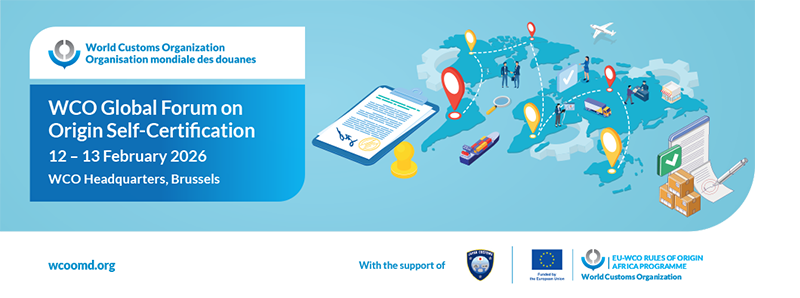The WCO published in October the Interconnectivity Framework for Certificates of Origin, which aims at ensuring that platforms supporting the exchange of electronic Certificates of Origin (COs) between exporting authorities and importing Customs administrations are aligned with a set of protocols, standards, and guidelines.
This publication is the result of extensive work carried out by the WCO Secretariat in collaboration with WCO Members, reflecting the Organization’s commitment to facilitating the establishment of smoother and more efficient electronic exchanges of origin information, saving time and effort for government agencies involved in setting up the legal, informatics and communications systems supporting such exchanges.
Standards-based interoperability is central to ongoing digitalization
The digitalization of origin-related procedures is a critical element in ensuring efficient, transparent, and secure trade under Free Trade Agreements (FTAs). In recent years, some countries and regional entities have created national and regional IT platforms to manage CO-related processes and exchange electronic data on proofs of origin. Such mechanisms have shortened CO issuance time, eliminated the need for traders to submit the certificate to the importing country, removed the burden on Customs to verify scanned documentary copies, and allowed authenticity checks to be performed in real time, at the moment Customs declarations are submitted.
However, each party often has a different mechanism, with its own technical standards and specifications, dataset for e-COs, data structures, message formats and information flows. This lack of harmonization hinders the transmission of electronic data on the CO between two or more governments through the interconnection of computerized systems. Therefore, there is a need for a common reference to enable seamless exchange of CO data under bilateral or multilateral FTAs, as well as guidance on the development of a technological solution for CO interconnectivity between parties.
A legal framework, a business process model, a dataset and technical requirements
In September 2023, to examine how to solve this issue, the WCO launched a Feasibility Study on the Interconnectivity Framework for Certificates of Origin.
An Informal Working Group (IWG), composed of interested Members of the Technical Committee on Rules of Origin (TCRO), was established to develop a standardized approach for enabling the exchange of CO data under bilateral or multilateral FTAs, as well as to provide guidance on designing a technological solution to support CO interconnectivity between parties.
The development process was divided into two phases. In the first phase, the IWG analysed business process models and recommended the Push Model[1] for CO data as the optimal model. The IWG also reviewed the dataset for e-COs, which was developed as part of the WCO Data Model. In the second phase, the Informal Working Group examined the legal framework and compliance, as well as the technological specifications and requirements for implementing such a mechanism.
Five annexes were also prepared. One of them examines the data elements to be exchanged under the Push Model, for which the WCO has developed a Derived Information Package (DIP) for COs as part of the WCO Data Model. Another two models have also been annexed for additional information: one examines the Semi-Automated Pull Model for Certificates of Origin, and the other examines a second type of proof of origin, namely, the Self-Declaration of Origin, and how the Push Model works in this case.
The Interconnectivity Framework was developed based on experience with preferential COs. However, in particular with regard to business process models and technological specifications, the Framework could be referenced for either non-preferential or preferential COs.
To enable Customs officials who are not familiar with the issues at hand to easily understand the various elements of the Framework, the WCO Secretariat is currently working on developing an e-learning course, which should be available in early 2026 on the WCO CLiKC! platform.
More information
Contact the WCO Secretariat
[1] Two models for the exchange of CO data were examined, namely, the Push Model and the Pull Model. In the Push Model, after the CO is issued, the exporting country’s authority transfers the CO data to the importing country’s authority. This allows the importing country to receive the CO data almost in real time and in advance of the claiming of the origin-based treatment process (i.e. import clearance). In contrast, the Pull Model requires that the importing country’s authority initiate access to the CO data from the exporting country’s outbound gateway, normally during the claiming of the origin-based treatment. Currently, most data exchanges for COs are implemented using the Push Model, and the IWG did not observe any fully automated Pull Model practice in use.
Save the date: Global Forum on Origin Self-Certification, 12-13 February 2026
Building on the recommendations coming out from the Global Forum on Origin Interconnectivity, the WCO will be organizing the Global Forum on Origin Self-Certification on 12–13 February 2026 at its headquarters in Brussels, Belgium. Funded by the European Union through the EU-WCO Rules of Origin Africa Programme and by Japan Customs, the Forum aims at sharing experiences, exploring innovative practices, and identifying strategies to enhance origin self-certification worldwide.
